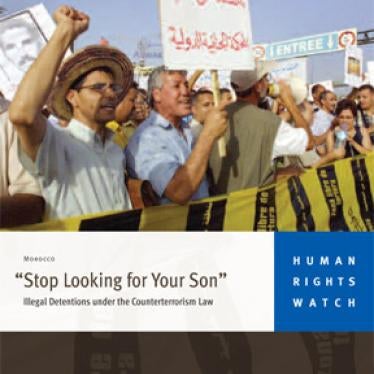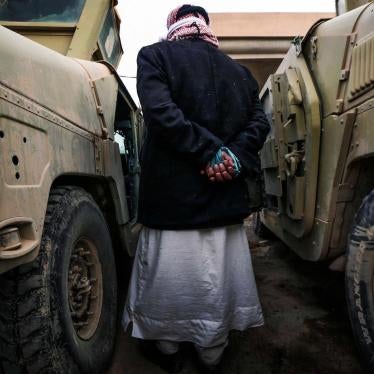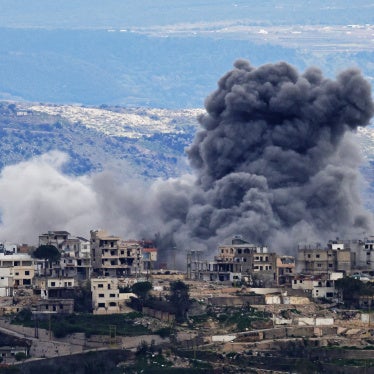(Rabat) - Suspects arrested under Morocco's counterterrorism law routinely face serious human rights violations that compromise their right to a fair trial, Human Rights Watch said in a report released today.
The 56-page report, "‘Stop Looking for Your Son': Illegal Detentions Under the Counterterrorism Law in Morocco," documents a pattern of abuse under the country's counterterrorism law, which was adopted 12 days after coordinated suicide bombings in Casablanca on May 16, 2003, took 45 lives. Many of these abuses violate the progressive legislation Morocco adopted to safeguard against torture and illegal detention, as well as international conventions that Morocco has signed, Human Rights Watch said.
The report is based in part on interviews conducted with persons detained under the counterterrorism law between 2007 and 2010 and their relatives. It includes a response from the Moroccan government, which Human Rights Watch welcomed.
"While Morocco has demonstrated the political will to adopt enlightened human rights legislation, it lacks the political will to enforce it when it comes to terrorism suspects," said Sarah Leah Whitson, Middle East and North Africa director at Human Rights Watch.
The pattern starts with the suspects' detention by agents in plainclothes, who show no identification, do not explain the basis for the arrest, and then transport suspects, blindfolded, to a secret place of detention, Human Rights Watch found. There, suspects often remain longer than the 12-day legal maximum in garde à vue, or pre-arraignment, custody, and many of those held under those conditions say that they were tortured or ill-treated in detention. The authorities eventually transfer them to a police station, where officers present them with a statement for signature. Only after they have signed do most of them first see a lawyer and are their families first notified of their whereabouts - sometimes four or five weeks after their arrest.
The failure of arresting agents to prove their identity as police is significant because the suspects and their families uniformly contend that those who carried out the arrests are agents of the domestic intelligence agency, the Direction Générale de la Surveillance du Territoire. Under Moroccan law, only the Judiciary Police is legally authorized to arrest and hold persons in garde à vue custody.
The suspects consistently told Human Rights Watch that arresting agents placed them in an unmarked vehicle, blindfolded them, and took them to a detention facility that they believe to be located in or near the intelligence agency's headquarters in Témara, outside of Rabat. Authorities deny that such a center exists.
Moroccan law forbids detaining persons in places outside the formal oversight of the Justice Ministry, which would include the intelligence agency's headquarters. It also requires police to inform the family as soon as authorities place someone in custody - a requirement that authorities systematically ignore, suspects and their families say.
Brahim Lahjouli, for example, told Human Rights Watch that after agents detained his brother Abderrahim in front of witnesses in Casablanca on March 30, 2010, the family had no news of his whereabouts until he turned up in prison on May 7. Abderrahim Lahjouli later told the family that he spent four weeks at Témara before he was transferred to a regular police station.
The report also describes the cases of defendants in the "Belliraj case" now serving long prison terms, on charges of having formed a terrorist network and committed common crimes to finance it. These men were detained in a similar fashion in early 2008 and held for weeks in secret detention. Their families finally learned their whereabouts from newspaper articles announcing the dismantling of the group.
Moroccan lawyers who defend clients held in garde à vue beyond the legal time limit say police routinely record a later date of arrest to hide the period spent in secret detention. Efforts by the defense to raise this and other procedural violations rarely, if ever, prompt the court to declare the suspects' "confessions" inadmissible and, in most cases, these "confessions" serve as the main evidence used to convict them.
"Moroccan law requires a court to dismiss confessions obtained by violence or coercion," Whitson said. "But when it comes to the counterterrorism law, the courts turn a blind eye to the coercive circumstances, and in some cases the torture, that preceded the confession."
The Moroccan government, in its response to the issues raised by Human Rights Watch, reprinted in full as Appendix 4 to the report, stated the following:
- The seven alleged terrorists arrested in 2010 featured in the report were in fact arrested on April 26 by the Judiciary Police and presented to the investigating judge on May 6 - within the legal time limit. The police held them in legal places of detention, which the general prosecutor oversees, and duly informed each family of the detention, as noted in the police logs.
- Detainees have the legal right to request a lawyer after the first four days in garde à vue but if they make no such request, the police are not obliged to provide access to a lawyer.
- The fact that some terrorism suspects refused to sign statements prepared for them by the police shows there is no coercion. Also, by law, the court treats these police statements, signed or not, as mere "references," with no evidentiary weight, that it must reject if found to have been obtained through violence or coercion.
- Allegations of torture made to Human Rights Watch by the suspects arrested in 2010 are not credible, since these suspects had the opportunity to lodge such complaints before the general prosecutor or the investigating judge and failed to do so.
Human Rights Watch is preparing a full reply to the government's response, which arrived on October 18, but noted:
- The accounts provided by families, often supported by witnesses, concerning the arrest of suspects days and sometimes weeks before the officially recorded date of detention, are credible by virtue of their consistency and detail. The families' affirmations that authorities did not notify them for days or weeks, even as many of them visited police stations and prosecutors' offices to inquire about their relatives or file missing-person reports, are also credible.
- Most, if not all, detainees featured in the report saw a lawyer only after they had signed their police statement - and thus, for many, two or more weeks after being taken into custody. At least one of the detainees - the son of a lawyer - told Human Rights Watch that his request to the police for a lawyer went unanswered. A system in which authorities interrogate persons in secret incommunicado detention and most detainees first see a lawyer after they have signed a police statement, does not, in practice, meet the international standard for ensuring suspects' prompt access to legal counsel.
- Some detainees said the police had used threats to get them to sign the statements without reading them. Others signed because, they said, they felt they had no choice or were exhausted. Moreover, it is questionable whether a signature is voluntary when the suspect has been held for days or weeks in secret incommunicado detention, has not seen a lawyer, and has possibly been tortured or ill-treated. And contrary to government assertions, these statements do provide the main evidence on which courts convict many suspects under the counterterrorism law, many defense lawyers say.
- Human Rights Watch does not have access to court files in cases that are still before the investigating judge, to know whether detainees or their lawyers raised allegations about torture or ill-treatment during interrogation. In some cases, their lawyers told Human Rights Watch that they did note the allegations before the investigating judge, and that the record for the session notes the complaint. In cases where trials have concluded, Human Rights Watch is not aware that the courts, beyond noting the complaint, investigated the complaints or dismissed any defendant's "confession" as a result. Defense lawyers said that while they have a legal right to request a medical examination to determine whether torture has occurred, such a request would serve little purpose because of the time elapsed - long enough for traces of torture to disappear.
Background
Almost four years ago, King Mohammed VI accepted the final report of Morocco's Equity and Reconciliation Commission (ERC), a truth commission that performed groundbreaking work on acknowledging and making reparations for "disappearances" and other grave government abuses in past decades. No less important, the commission made recommendations to the government to prevent and punish future abuses, many of which have yet to be implemented.
In the earlier period, hundreds of those who were abducted by state agents "disappeared" forever and are presumed dead. In the present pattern, the "abducted" person turns up within several weeks, if not sooner, in custody.
While the abuse itself may be less grave than in the past, the disregard for the law by the security forces is no less flagrant. Many victims of such illegal practices are currently serving long prison sentences, after unfair trials. Moroccan authorities have largely failed to investigate the credible and repeated allegations of violations of the laws governing the arrest and detention of suspects, to eradicate these practices, and to hold perpetrators accountable.
"Morocco has many strong laws to safeguard against abuse, but its failure to apply them to stop these illegal arrests and secret detentions undermines not only the rule of law but also the legacy of the Equity and Reconciliation Commission," Whitson said.
Human Rights Watch recommended that the government:
- Ensure that state agents, when taking a person into custody, always provide that person with proof of their affiliation with an agency empowered to conduct arrests, and disclose the basis for arresting that person.
- Enforce compliance with all Moroccan laws governing garde à vue detention by opening investigations wherever there is evidence that police or other state agents may have held a suspect for any period outside a recognized place of detention, willfully recorded a false date of arrest to cover up secret or illegally-prolonged garde à vue detention, denied a suspect access to a lawyer, or failed to present the suspect before a judge within the time limits prescribed by law.
- Hold arresting officers accountable for any failure to inform the family promptly of the arrest and whereabouts of a suspect, as per article 67 of the Penal Procedure Code.
- Allow national and international nongovernmental human rights organizations access to visit all places of detention, including any located in Témara.








